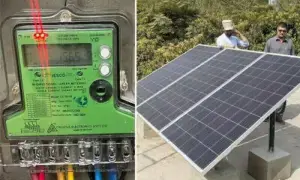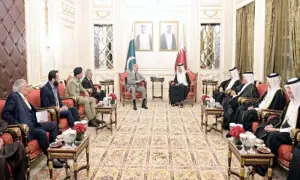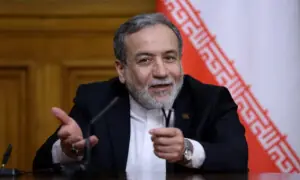Bangladesh forms multilateral partnership to mitigate effects of climate change
3 min readBangladesh has formed a multilateral partnership with global institutions to enhance the nation’s ability to mitigate and adapt to the effects of climate change, the International Monetary Fund (IMF) said on Sunday.
“This partnership, the first of its kind in Asia, takes place in the context of the $1.4 billion Resilience and Sustainability Facility (RSF) arrangement approved by the IMF’s Executive Board in January 2023, the programmatic series of Green and Climate Resilient Development (GCRD) Policy Credits by the World Bank totaling $1 billion, and the ADB’s ongoing funding for climate projects in Bangladesh,” it said in a statement.
The newly launched Bangladesh Climate and Development Platform (BCDP) is supported by the Asian Development Bank (ADB), World Bank, International Finance Corporation (IFC), Multilateral Investment Guarantee Agency (MIGA), Asian Infrastructure Investment Bank (AIIB), Agence Française de Développement (AFD).
The European Union and the European Investment Bank (EIB) as part of Team Europe, the Green Climate Fund (GCF), the South Korea, Japan International Cooperation Agency (JICA), and the United Kingdom are also part of the group.
The collaborative support will bolster Bangladesh’s efforts to address the impact of climate change on vulnerable communities.
The RSF arrangement and the GCRD credits will support reforms to strengthen Bangladesh’s resilience to climate change, advance the decarbonisation of the economy, and manage transition risks.
According to the IMF, $1.85 billion policy-based lending has been allotted by the parties.
“The ADB is processing a $400 million policy-based loan to Bangladesh in 2023. About 53% of the ADB’s 2023 project financing ($1.9 billion) has been allocated towards climate financing so far,” the Fund said.
The ADB is committed to allocating more than half of its 2024-26 allocation for Bangladesh ($5.5 billion) in support of the government’s climate agenda, it added.
The Korean government also pledged $50 million, and the AIIB is considering the provision of an additional $400 million in 2024 at the request of the Bangladeshi government.
“The World Bank’s $1 billion in Green and Climate Resilient Development Policy Credit series financing is helping the country’s transition to green and climate-resilient development,” the IMF stated.
The WB is also supporting Bangladesh’s alignment with Article 6 of the Paris Agreement, to better access and utilize international climate and carbon finance, through enhanced institutional arrangements and preparation of the first Article 6 carbon market transaction.
The GCF is supporting several public and private sector projects, totaling over $400 million, including national direct access entities and in sectors such as energy, agriculture, water management, and resilient livelihood.
The EU and the EIB, as part of Team Europe, have committed to providing a “Bangladesh Renewable Energy Facility,” consisting of an EU-guaranteed EIB Loan of $381.5 million.
The Renewable Energy Facility is expected to mobilise up to $763 million in investments and to contribute to the installation of an estimated 750 MWp of new renewable energy capacity in Bangladesh.
The EIB support will be accompanied by an EU Grant worth $49 million, including Technical Assistance ($6.5 million) and an Investment Grant ($42.5 million) provided under the EU Global Gateway strategy, as part of the Team Europe Initiative on the Green Energy Transition.
Agence Française de Développement (AFD) is processing a $320 million climate policy-based loan programme.
For the latest news, follow us on Twitter @Aaj_Urdu. We are also on Facebook, Instagram and YouTube.



























Comments are closed on this story.